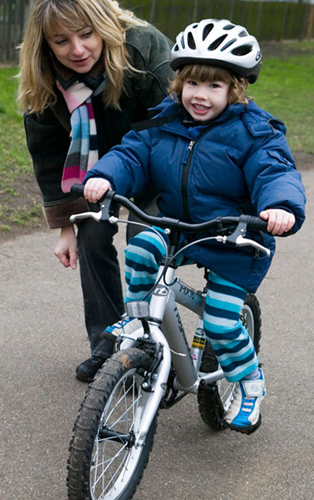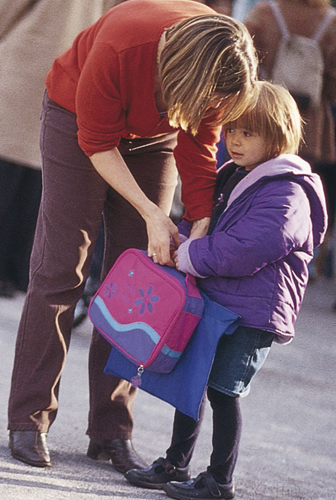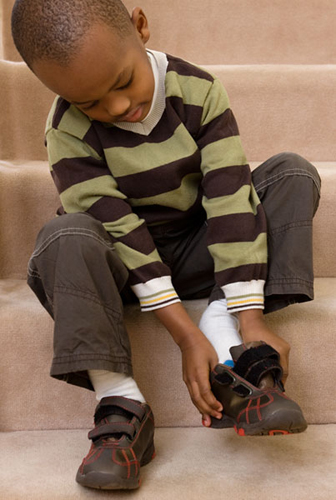| Q: |
My son complains of stomachaches on school days. Is he just attention-seeking?
|
| A: |
Upset stomachs and headaches are often a sign of anxiety, but you
may want to rule out any physical causes with a visit to your
pediatrician. However, if your son is genuinely worried about school,
his stomachache may be very real, even if there is no medical
explanation. Talk to him when he feels safe and relaxed (perhaps at
storytime) to see if there is anything specific he is worried about. It
can help to keep track of when he reports feeling ill to see if there
are particular days or activities he is concerned about. Make an
appointment to see his teachers and share your concerns with them—they
may have ideas about what is going on, too. Let your son know that you
are taking him seriously and you are working with the school to make
things better for him.
For a small number of
children, anxiety about school can develop into a phobia, so it is
important to address issues quickly and sensitively to prevent things
from escalating.
|
| Q: |
I’m getting reports from school that my son is being disruptive in class. He’s fine at home. What can I do?
|
| A: |
Starting school brings a whole new set of challenges for children
to deal with. They have to follow a set routine for most of the day,
learn and follow the school rules, and fit in with everyone else. As
they progress through school, the emphasis shifts from learning through
play to more academic work, which means that children have to sit down,
listen, and focus their attention on a task. Some children find it more
difficult to control their behavior and may only be able to concentrate
for short periods before needing a break. This can make learning more
difficult and lead to feelings of frustration. Others may struggle with
certain subjects, such as reading or math, which may result in them
being disruptive.
Speak to your son’s
teacher to find out exactly what is going on. Agreeing some simple,
achievable targets with the school can help make it clear what is
expected. Your son may feel disheartened about the situation, so make
sure he gets plenty of praise and encouragement to boost his
self-esteem. A home/school diary can also be used to share good news.
|
| Q: |
My daughter is afraid of her strict teacher. What should I do?
|
| A: |
Trying to maintain order in a large class of noisy, excitable
children is no easy task. Teachers take control in different ways, and
some are bound to be more authoritarian in their approach. This style of
classroom management can be difficult for children who are not used to
raised voices and stern faces. Young children may also feel that the
teacher is targeting them personally rather than addressing the behavior
of the whole class, and may be very sensitive to being “scolded” if
they have not done anything wrong. Try discussing things with your
daughter to help her see that the teacher’s behavior is not just
directed toward her. If she continues to be upset, arrange to meet with
her teacher to explain how she feels. Making her teacher aware of the
situation will make her sensitive to your child’s reaction. It is
unreasonable to expect that your daughter will get along well with all
of her teachers.
|
| Q: |
Going back to school after a break always seems to cause problems. Is there anything I can do?
|
| A: |
The longer the holiday, the more difficult it can be to make the
shift back to school routines and work. At the start of a new school
year, some children may also feel anxious about changing to a new class
and having a new teacher.
It’s important to
keep things relaxed over school breaks, but try to keep some routines in
place—even if things like bedtime may happen a little later. You can
also help to keep school on the agenda by talking about friends and
activities she enjoys at school. Shopping for new school supplies will
also help her to start preparing for the return to school. Toward the
end of vacation, you will need to gradually reign in your child’s
bedtime routine so that her sleep pattern fits with the early-morning
start.
|
| Q: |
My son never tells me anything about school. Should I give up?
|
| A: |
When your son has been working hard all day at school, the last
thing he will feel like doing is going through it all again in detail.
Give him some time to relax, then pick up the conversation with him
later. It’s frustrating to feel that your child is shutting you out but,
the more you push him to talk, the less willing he will be to share
things with you. Make yourself available to talk when he is ready:
Helping out with homework can be a good time. Start with general
questions then try focusing on particular classes or activities: “What
did you do in science today?” might get you further than “How was
school?” Check his bag for notes from school and use these to stimulate
conversation about activities and events in school. If you show that you
are interested, he will let you know how things are going in his own
time.
|
School holidays
School breaks are both
loved and dreaded by parents. You may find yourself counting down the
days to the start of school if you don’t plan ahead.
Structure and routine
As much as your child
may be looking forward to vacation, moving from the structure and
routine of school to the freedom and flexibility of one or more weeks at
home can be difficult. Help everyone enjoy the break by maintaining
your child’s familiar routines. As children get older, you may want to
allow them to stay up a little later when school is out. If so, agree a
time and stick to it.
Things to do
Rather than having to
think up activities on the day, it’s helpful to draw up a list of fun
things to do before the break begins. The weather will play a part, so
make sure you have a number of wet and dry options. For example, you
could go on a bike ride together, see a movie, go swimming, go bowling,
visit a museum, go for a picnic, walk a nature trail, play board games,
do arts-and-crafts activities, or bake cookies and cupcakes. School
breaks are a prime time for family-friendly entertainment, so look in
the local papers and on the internet to see what is going on in your
local area. Involve your child in deciding what you will do together
each day, but don’t overload him with too many choices. Agree the order
of things so that everyone knows what is happening. Try to balance
indoor and outdoor activities, and arrange play dates if your child has
friends who live nearby.


NOTE
All children need to learn to cope with change, but some take longer to adjust
Preparing for school A new beginning
Making the move to school
is one of the biggest transitions in your child’s life. Some children
will be excited by the new opportunities this brings, and others will be
worried about leaving the comfort and familiarity of the people they
know. Make it clear to your child that he’ll be going five days a week,
so he doesn’t think this is a one-time event! Parents may also feel
anxious about how a child will adjust, and sad that he is growing up so
fast.
Get to know your child’s school
Going on at least one
visit to his new school, meeting his teacher, and spending time in his
classroom will make it much easier for your child to settle in once he
starts. With the school’s permission, you could even take a photo or two
to remind him of where he will be going and who he will meet. Over the
summer, practice the route you will take to school. Try a couple of full
dress rehearsals so that you and your child can get used to the new
morning routine.
New shoes
Children enjoy
helping to choose new things for school, such as shoes, bags, lunch
boxes, and pencils. Stores tend to sell out of popular items, so try not
to leave everything to the last few days before school starts. Buying a
few things at a time over a longer period will help him get used to the
idea of starting school. Remember to label everything clearly with your
child’s name.
The big day
Get things ready the
night before, and make sure you both get up in plenty of time. When you
get to school, your child may want to stay firmly by your side, or he
may see a friend and want to spend a few minutes playing. Stay with him
until the bell rings, then give him a hug and a kiss, and say good-bye.
Remind him that you will be there to pick him up later, then wave and
leave.
After school
Greet your child with a
big hug and a warm, welcoming smile. Take time to look at the things he
has brought home, and put his work on display to show how proud you are.
The first day
When you get to school,
boost your child’s confidence by talking about the fun she will have and
the new friends she will make. Make sure she has all her belongings,
then calmly take your leave.

Morning routine
Make sure you have
plenty of time to help your child get ready in the morning before school
when he is still young. Short cuts, such as shoes with Velcro straps
instead of laces, may speed up the process.
